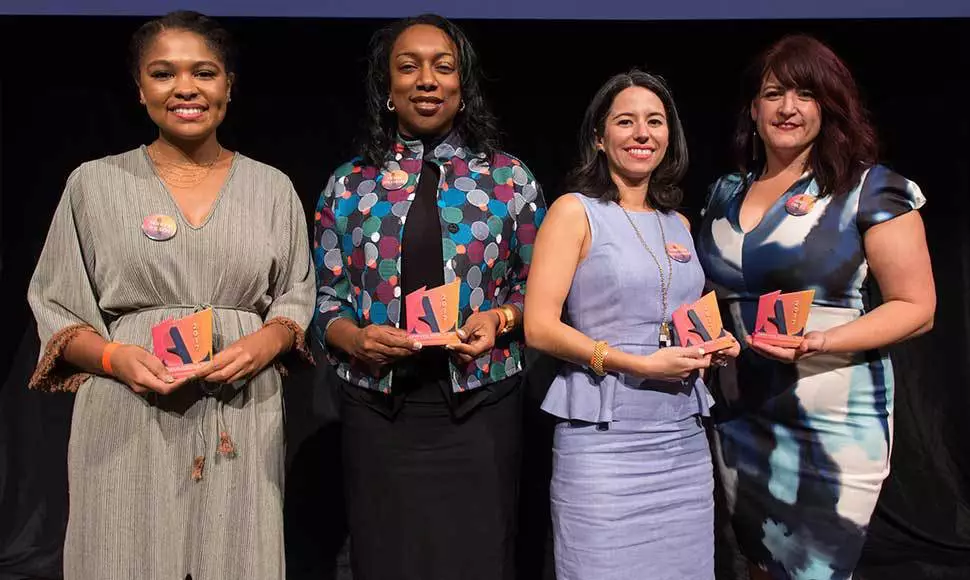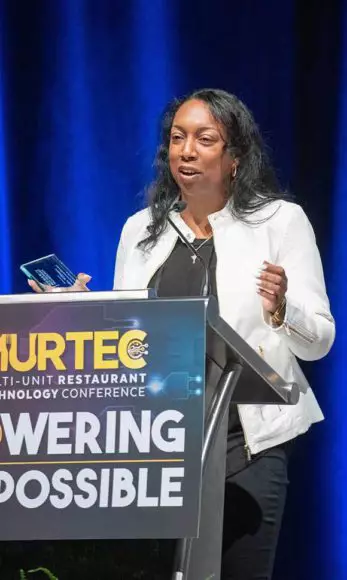A womanтАЩs place is at the keyboard: Exploring the role of women in tech

Written by Elizabeth Exline

Reviewed by╠¤Kathryn Uhles, MIS, MSP,╠¤Dean, College of Business and IT

Much has been written about careers in information technology. ItтАЩs a thriving field, one that enjoys╠¤╠¤even as the╠¤post-pandemic job market╠¤struggles to regain lost ground. But, like any industry, it also has its challenges. One of these is a╠¤╠¤its talent base to include more women and people of color.
ThatтАЩs not to say itтАЩs impossible for women and people of color to succeed. But the roadblocks to opportunity can sometimes be discouraging or even defeating. And that makes the question not one of possibility but of desirability. Is a career in tech worth it for women when itтАЩs such an uphill battle?
Born to code
╠¤remembers well her initial brush with technology. She was a freshman in high school when her father brought home the familyтАЩs first computer.
In the beginning, it was just another toy, something Williams could tinker with and learn from. But she soon realized there was potential for much more. She began to build out programs тАФ her first was a calculator тАФ and she was hooked.
"To me, it was just so cool to be able to build something that I could use," Williams explains. "ThatтАЩs what really attracted me to computer science and technology. And really, thatтАЩs whatтАЩs kept me in it. ItтАЩs just always trying to solve a problem, and youтАЩre able to do that through being creative."
Williams would go on to pursue a degree in computer science before launching her career as a software engineer. Mid-career, she completed her╠¤Master of Information Systems╠¤▓╣│┘╠¤░─├┼╠ь╠ь▓╩┐к╜▒╝╟┬╝╠¤(UOPX) and today works as a principal Amazon Web Services (AWS) training architect for╠¤. (She is also an AWS Machine Learning Hero, APN Ambassador and Alexa Champion тАФ all various distinctions from AWS.) But her path, while ultimately successful, couldтАЩve been smoother.
Tech challenges
Williams has worked for a number of household names over the years, but the illustriousness of her resum├й belies the obstacles sheтАЩs had to overcome along the way. First, there was the discovery that she was the exception rather than the rule when it came to demographics.
╠¤

"When I was a summer intern at the National Security Agency, there was only one other woman on the team тАж [and] thatтАЩs when I realized what corporate America really looked like," Williams recalls.
Then there was the issue of career growth. Williams would routinely watch male counterparts rise through the ranks and receive manager roles based on their potential rather than their performance. Williams, meanwhile, would have to prove "five or six times" that she could do something before she would get that same opportunity.
"Being a black woman in tech," Williams says, "I canтАЩt let what other people think about me change how I feel or think about myself because IтАЩve been put in several situations where I was just like, тАШOkay. Why am I even here? YouтАЩre not fully utilizing my skills. IтАЩm not given the same opportunities. Did you just hire me to check a box?тАЩ
╠¤
"So, being in a situation like that, it starts to play with you mentally. You start to question your abilities, and you start to think something is wrong with you. For many years in my career, I even considered leaving ITтАж but then I just had to find that validation from within. Once that started happening, I started getting my confidence back."
Williams, who began teaching and mentoring after she earned her masterтАЩs degree, gradually learned to look for professional validation through the number of people she helped rather than the number of promotions she received. This, she says, helped recalibrate her confidence and her commitment to a career she loved, even if the field itself was problematic.
Women in tech, by the numbers
They say that numbers donтАЩt lie, and in the case of women working in IT, they bear out WilliamsтАЩ experience.
According to the 2021╠¤╠¤by TrustRadius.com, "Women in tech are nearly twice as likely as men to have lost their jobs or been furloughed due to the pandemic."
TrustRadius.com points to higher levels of burnout and family commitments as contributing to this trend, pointing out the issue of female employment transcends the tech industry to be a "holistic way women are impacted by responsibilities at work and at home."
When it comes to the field of tech, finding a balance between work and family can feel especially tough. It is an industry dominated by men who donтАЩt always share the same family obligations as their female coworkers.
Williams, for example, didnтАЩt lose her job during the pandemic, but she has on more than one occasion been the only one in a room to leave a meeting early in order to pick up her kids.
"All of my kids went to the after-school program, and you have to be there at a certain time [or] they would charge you fees by the minute. So, I would always put them first, [even] if there was a meeting I had to leave or I had to miss."
It doesnтАЩt sound like such a big deal, having to miss a meeting now and then to pick up your kids. But itтАЩs an example that speaks to a much deeper series of commitments. ItтАЩs juggling after-school pick-ups and activities╠¤every day. ItтАЩs finding last-minute childcare тАФ or taking a sick day тАФ when your child falls ill. ItтАЩs figuring out how to excel at work, nurture your family and just get dinner on the table every night. When youтАЩre the only one (or one of a few) who has to juggle this rotating circus of commitments, it can lead to burnout or career changes pretty quickly.
Not convinced? Then consider these numbers. According to a recent study by╠¤, "Half of the young women who go into tech drop out by the age of 35, and [women leave] tech roles at a 45% higher rate than men."
This contributes at least in part to the findings recently reported in╠¤: "The gender gap for women in technology as a whole is actually worse today than it was in 1984." (Forbes cites the same╠¤╠¤for that data. In 1984, 35% of tech workers were women. Today, that percentage is 32%.)
Even if this pressure doesnтАЩt equate to leaving a job or even IT altogether, it does set women up to settle for less. Williams, for example, points out that sheтАЩs stayed in roles where she wasnтАЩt appreciated or being promoted (despite receiving excellent reviews and requesting opportunities for advancement) because she needed to provide for her family as a single parent. Choosing the stability of a well-paying if limiting career over the risk of changing jobs can feel uniquely pertinent to women, especially women of color.

Why women matter
It could be easy to assume in the face of the numbers that maybe women just arenтАЩt as interested in tech as men. Or that it doesnтАЩt matter if itтАЩs men or women filling the role, so long as someone is helping fill the growing demand for tech workers. (The╠¤, for example, is up 50% since 2015.)
But a diverse team adds more than you might think. As noted in the╠¤, "diversity has been linked with driving innovation, reducing bias and raising tech company share prices."
That means whether a companyтАЩs goal is to improve its competitive advantage, add value for its shareholders or simply do the right thing, women and people of color matter.
Williams puts it another way: "When we think about having diverse teams, itтАЩs important for teams to look like the people that theyтАЩre building the software for. тАж If you donтАЩt have a diverse team building those solutions and testing those solutions, then youтАЩre more prone to release errors or bugs in production, which then requires more maintenance time, more money for maintenance and things of that nature. So, at the end of the day, diverse teams produce better systems."
Advantages for women working in IT
While the challenges facing women in tech are numerous, the field is not without its attractions. Shirleen Hill-Omega, for instance, sees IT as being well-suited to women.
Hill-OmegaтАЩs career trajectory is markedly different from that of Williams. As an immigrant from the Philippines, Hill-Omega started out in nursing school but felt overwhelmed by it. "In the technology world, you crash a computer, and you can restore the data," she explains. "With human beings, if you give the wrong medication, it will affect that personтАЩs life!"
When she was just one year away from graduating from nursing school, Hill-Omega switched gears, eventually pursuing her╠¤Bachelor of Science in Information Technology╠¤at UOPX. Today, she works as an IT specialist for the Arizona Department of Agriculture, where she has been for the last 19 years.
To her mind, the remote roles offered in IT support and cybersecurity dovetail nicely with the flexibility needed to raise a family, travel and enjoy life outside of work.
Despite encountering some very real challenges as a woman in tech, Williams also recognizes the advantages her sex has afforded.
"At first, I kept saying, тАШThereтАЩs no advantage [to being a woman in tech]. I havenтАЩt seen an advantage,тАЩ" Williams says. "But then, when I really thought about it, [I realized] itтАЩs given me this great work ethic, and it just comes naturally for me to always go above and beyond, because IтАЩve had to do that so often."
Tech in evolution
One of the most appealing characteristics of technology careers may well be the capriciousness of the technology itself.╠¤Skills that are in demand today╠¤could be obsolete tomorrow, which means IT often attracts lifelong learners.
"I would definitely say IT is not a boring field," Williams says. "The technology is always changing, so if you want to remain marketable, you have to keep your skills current. So, IтАЩm always in this continuous learning mode, which for me is exciting."
Hill-Omega has also seen the field evolve over her nearly two-decade tenure. At the outset of her career, Hill-Omega was joined by four other women, all of whom had been reorganized into the IT department after previously working in administration. Today, there are just two women on her team.

What began as a repository for restaffed administrative personnel has grown into a competitive field where education is key to success. Depending on the kind of career students envision, a╠¤computer science degree,╠¤IT degree╠¤or even╠¤cybersecurity degree╠¤can all serve as pathways to jobs in IT.
Advanced degrees also offer value. Williams pursued her╠¤masterтАЩs degree╠¤because she wanted to teach and mentor others, but there were unexpected benefits for her full-time career, too. She learned skills like project management and leadership that she uses today and that she credits with helping her eventually move into a leadership role.
"Before going into the [masterтАЩs] program, I thought I just needed to be a great coder in order to move up the ladder," she says. "But if I had only focused on that, I wouldтАЩve reached a hard limit where I couldnтАЩt continue to move up. You have to be able to collaborate. You have to be able to work with businesspeople and break things down so that a business person understands the technology."
The future of women in tech
As evidenced by the experiences and outlooks of Williams and Hill-Omega, IT offers a breadth of opportunity and challenges for women. They are, in essence, the trailblazers for the next generation of women who will see their success as not only possible but probable.
That, anyway, is the hope of Girls Who Code (GWC), an international nonprofit working to close the gender gap in tech. As noted in the , Girls Who Code has developed university-level networks of alumni and other young women in computer science, which they call College Loops. These are led by GWC alumni and open to any women studying computing or interested in technology with the goal of using mentorship to keep women on the tech career track.
Today, GWC has 200 College Loops at four-year universities and community colleges across the country. Its college-aged alumni, the , "are majoring in computer science at a rate of 15 times the national average, and the group is on track to close the gender gap in entry-level tech jobs by 2027."
GWCтАЩs success may just be the first step in remediating some of the challenges women face in IT in terms of studying computer science and related subjects. As for sticking with it and demanding equal opportunity and advancement? Well, if Williams and Hill-OmegaтАЩs stories are anything to go by, the passion IT can inspire in women may just be enough to keep these trailblazers in it until a more inclusive environment is achieved across the board.
In other words: Yes, a career in IT is indeed worth it for women.
Curious about where a computer science degree can take you? We explore careers, tips and more in our blog!
Discover the Bachelor of Science in Computer Science at ░─├┼╠ь╠ь▓╩┐к╜▒╝╟┬╝!
╠¤

ABOUT THE AUTHOR
Elizabeth Exline has been telling stories ever since she won a writing contest in third grade. She's covered design and architecture, travel, lifestyle content and a host of other topics for national, regional, local and brand publications. Additionally, she's worked in content development for Marriott International and manuscript development for a variety of authors.

ABOUT THE REVIEWER
Currently Dean of the College of Business and Information Technology,╠¤Kathryn Uhles has served ░─├┼╠ь╠ь▓╩┐к╜▒╝╟┬╝ in a variety of roles since 2006. Prior to joining ░─├┼╠ь╠ь▓╩┐к╜▒╝╟┬╝, Kathryn taught fifth grade to underprivileged youth in Phoenix.
This article has been vetted by ░─├┼╠ь╠ь▓╩┐к╜▒╝╟┬╝'s editorial advisory committee.╠¤
Read more about our editorial process.


